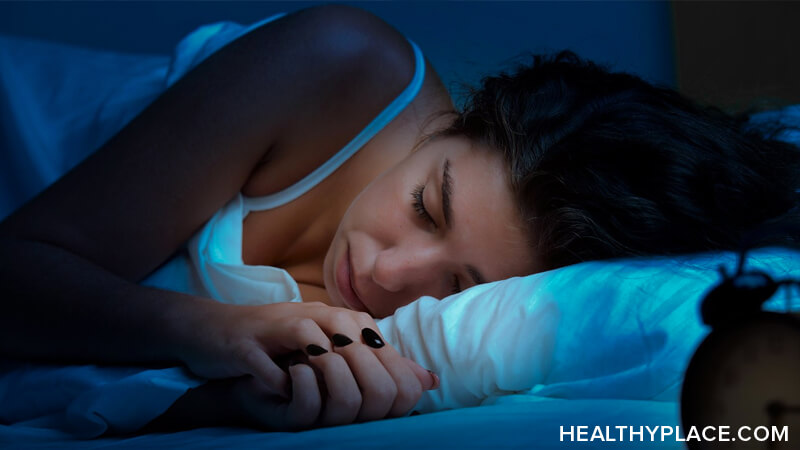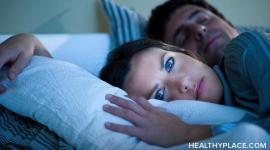Bipolar Disorder and Sleep Problems

In-depth info on bipolar and sleep problems, like insomnia. Why many with bipolar disorder have a sleep disorder. How to improve bipolar disorder sleep.
Both, in cases of mania and depression in bipolar disorder, sleep disorders are common. In depressive episodes, a person with bipolar disorder is more prone to hypersomnia (excessive sleeping) as well as non-restorative sleep. In a manic phase, the person commonly feels less need for sleep (insomnia), sometimes staying up 20 hours at a time, or more.1
What is Bipolar Disorder?
Bipolar disorder is characterized by dramatic shifts in mood from mania (or hypomania) to depression. Typical manic symptoms include:
- Racing thoughts
- Elevated or irritable mood
- Rapid, excessive speech; frequently changing topics
- Decreased need for sleep
- Grandiose beliefs
- Increased goal-directed activity
- Impulsivity and bad judgment
Symptoms of depression include:
- Feelings of sadness, anxiety, irritability or emptiness
- Feelings of hopelessness or worthlessness
- Loss of enjoyment in things previously found pleasurable
- Lack of energy
- Difficulty thinking, concentrating or making decisions
- Changes in appetite and weight
- Thoughts of death or suicide
- An increase or decrease in sleep
The Link Between Bipolar Disorder and Sleep
The human body has a built-in clock telling every cell in the body what time of day it is; this is known as the circadian clock or rhythm. This internal rhythm synchs to external cues such as the rising and setting of the sun and mealtimes, and directly affects when the body sleeps. While anyone can experience insomnia or another sleep disturbance when their circadian rhythm is disrupted, those with bipolar disorder seem to be particularly sensitive. Something as simple as staying up late to attend a party may disrupt the circadian rhythm enough to provoke insomnia.
Insomnia Can Predict or Cause Bipolar Depression or Mania
While a night of insomnia is normally considered simply a hassle, for a person with bipolar disorder it may signal an oncoming depression or manic episode. Studies have found that between 25 and 65 percent of bipolar patients experienced an interruption in circadian rhythm just prior to a manic episode. To make matters worse, a perceived lack of need for sleep is common in manic episodes. Once the mania begins, a person is likely to further deprive themselves of sleep, making the mania worse.
1Purse, Marcia. Mood Disorders and Sleep About.com. June 20, 2006 http://bipolar.about.com/cs/sleep/a/0002_mood_sleep.htm
2Turim, Gayle. Bipolar Disorder and Sleep Problems Everyday Health. Oct. 23, 2008 http://www.everydayhealth.com/bipolar-disorder/bipolar-disorder-and-sleep-problems.aspx
APA Reference
Tracy, N.
(2019, September 8). Bipolar Disorder and Sleep Problems, HealthyPlace. Retrieved
on 2026, February 26 from https://www.healthyplace.com/other-info/sleep-disorders/bipolar-disorder-and-sleep-problems


